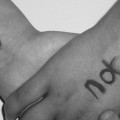
Suicide is and will always be a shocking notion. Because of this, people don’t always know what they should or shouldn’t say to someone in the wake of their loss, or if they should say something at all. As a survivor, I can say that it’s always better to say something to the bereaved versus avoiding the subject. It shows you care. Following are a few of the tips I would offer to someone who wants to reach out to a suicide survivor with words of encouragement.
Keep It Simple
Some people might worry that addressing the loss with a survivor might open up a discussion they don’t want to have. To this, I would  suggest writing a simple sympathy card letting the survivor know that you and their loved one are in your thoughts (even if you didn’t know their loved one). Or, do the same with a brief greeting if you will be seeing them in person. You might also consider sending some flowers or a plant. In the days immediately following the loss, this also leaves the conversation in the hands of the survivor, who may not be ready to talk in further detail. However, they will always remember that you reached out during a terrible time. I kept all of the cards I received after my dad’s passing and will even read through them from time-to-time, feeling comforted by the fact so many people from all walks of my life decided to share words of support when I needed them most. If the person is a co-worker, you might say, “please take the time you need to heal, we’ve got things covered here.” If you’ve also lost someone to suicide, you could say, “I lost my (blank) to suicide. If you’d ever like to talk, we could grab coffee. I know this is a difficult time.”
suggest writing a simple sympathy card letting the survivor know that you and their loved one are in your thoughts (even if you didn’t know their loved one). Or, do the same with a brief greeting if you will be seeing them in person. You might also consider sending some flowers or a plant. In the days immediately following the loss, this also leaves the conversation in the hands of the survivor, who may not be ready to talk in further detail. However, they will always remember that you reached out during a terrible time. I kept all of the cards I received after my dad’s passing and will even read through them from time-to-time, feeling comforted by the fact so many people from all walks of my life decided to share words of support when I needed them most. If the person is a co-worker, you might say, “please take the time you need to heal, we’ve got things covered here.” If you’ve also lost someone to suicide, you could say, “I lost my (blank) to suicide. If you’d ever like to talk, we could grab coffee. I know this is a difficult time.”
Offer Specific Forms of Help
Is there something you could offer the bereaved? Offer your suggestion one time to the person and perhaps jot down your e-mail address  and phone number with the idea – a home-cooked meal in a disposable container (and note the date you will drop it off), a few dog walks (each night the week after the loss), mowing the lawn (say you’ll stop by the next weekend), a grocery store run for some essentials or a ride to church, etc. This felt more helpful than “Is there anything I can do?” or “Let me know if you need anything.” I didn’t know what to ask for and I didn’t know if the person really meant it. Also, whatever you can do or drop off that doesn’t require an interaction in those early days is best. We might dread the potential questions or advice and turn down the help, even if it’s needed.
and phone number with the idea – a home-cooked meal in a disposable container (and note the date you will drop it off), a few dog walks (each night the week after the loss), mowing the lawn (say you’ll stop by the next weekend), a grocery store run for some essentials or a ride to church, etc. This felt more helpful than “Is there anything I can do?” or “Let me know if you need anything.” I didn’t know what to ask for and I didn’t know if the person really meant it. Also, whatever you can do or drop off that doesn’t require an interaction in those early days is best. We might dread the potential questions or advice and turn down the help, even if it’s needed.
Be Patient
It could be weeks, months or even years before the survivor is ready to talk about what happened or share memories or look at photographs. Unfortunately, many people go back to their everyday lives soon after the death but survivors carry this loss with them forever. It can be difficult for survivors who do want to talk about their loss later or feel that people around them still care and acknowledge what happened. I would just suggest checking back in a few months or even a year after the loss to let the person know you’re still thinking about them. If they are receptive, they may open up. If not, drop it for the time being. You could even give another card that says “thinking of you” several months or even a year later.
Don’t Question or Press for Answers
It is not anyone’s job to ask, “why do you think your loved one did this?” or “did you have any idea?” or “were there any warning signs?” or any specific details about how they died. This is a big no. Yes, everyone, including the bereaved, wonders these same things and is still reeling with these questions themselves. Most survivors will never know the answers. Similarly, don’t press to talk about the suicide if the survivor doesn’t appear to want to talk about it or push for the person to accept your help.
Avoid Comparisons and “Shoulds”
Despite best intentions, avoid using terms like, “I know just how you feel because (insert comparison).” One time, I heard, “because I just lost my dog.” For some reason, I even felt upset when someone would say, “because I just lost my grandfather.” Maybe it’s because I felt that that person lived a full and possibly happy life and my dad chose to end his without warning in a gruesome way. It just didn’t feel like a valid comparison to me. It’s also hurtful to say, “your loved one is better off” or “I bet they regret what they did” or “suicide is a sin, etc.” or “You’re so strong, you’ll be fine.”
By the same token, don’t say something like, “well, at least you still have another parent/sibling/child, etc.” A loss is a loss and that person will never be replaced by any living or future person.
Lastly, it’s best to avoid prescribing any “shoulds” to survivors – such as, “you should move,” or “you should keep/get rid of their things,” or “you should get help.” Even among survivors of suicide, the way we choose to grieve and proceed in our journeys is unique. You could share what you did but don’t try to force the survivor into anything, even if you think it would be helpful.
For survivors, I would share the reminder that most people mean well and do want to share support. If someone says something silly, try your best to just brush it off and realize that they likely didn’t mean anything to be offensive.
Were there things people said to you that you did or didn’t appreciate? What advice would you give to people on how to talk to suicide survivors? This will likely be a topic you’ll hear from us again and in new ways as it was such a big one.




I absolutely agree that I would much rather people approach me about my parent’s deaths than to not say anything at all. From a survivor’s standpoint, I am not looking for magical words to make things better. I am touched when people close and not-so-close to me ask me about my parents, and appreciate knowing that my parents are on their minds, too.
The one thing I hate that people have said to me is “suicide is a selfish act”. I do not feel my son was selfish. He was hurting. In fact I feel he was selfless because he hid his pain so well that no one had any idea that he might do what he did. He wanted to protect us all from the pain he felt. I often compare someone suffering from mental illness to some one suffering from cancer. There are treatments but sometimes they just don’t work and people lose the battle they were fighting.
I hate that, too. I actually wrote a post about that in the wake of Robin Williams’ death because it was one of the most prominent misconceptions that was elevated in the media. http://www.oursideofsuicide.com/2014/08/12/5-myths-about-suicide/
Your analogy is so beautiful and so on point. Thank you for sharing your story. I know how hard it is to open up after losing someone you love.
The thong that hurt me the worst was when our son’s long time friend and Methodist minister said, “God gives everybody free will. Mark made his choice.”
I feel that our son was so disturbed and depressed that he was unable to make a rational choice. It offends me that a man who should have known better would say that to his grieving parents.
That’s a really tough thing to hear. It’s been interesting for Jessica, Lindsay and me being in the LOSS program because it was founded by a Catholic priest who has adopted a much more empathetic and understanding outlook on suicide. Unfortunately, many clergy members do not embrace the same approach with survivors. I couldn’t agree more that irrational thoughts take over by the time someone has made the choice to pursue suicide. That has come up as the three of us compared their final actions or even notes. Much of it didn’t make sense, which is sad.
Everyone was angry at him for “hurting me”. Several people said I was better off or that it was better that he was gone. Please people – never say things like that to a survivor. It makes them feel soooo alone in their grief!!!
I lost my Daddy to suicide on 12-14-13. He was the most laid back, Funny, happiest guy I ever knew. My hero.
It was a gruesome death, my brother and I watched as Drs did for. We had to tell them to let him go. It was hard. Being a survivor has got to be one of THE HARDEST things to be. It’s lonely. Thank God for my brother, he is the only one that truly gets my pain & I get his.
I know SOME people mean well and say hurtful things without knowing that hurt. I try to just thank them for acknowledging my Daddy & go on. I cannot stand for people to call it a “cowardly act”, I want to say ,” I don’t find it very cowardly to get a gun, put it to your head and pull the trigger!” That takes a lot of pain to use that as a means to end it.
Robin Williams passed not long after my Dad, so Facebook was full of opinions. One lady said, ” he’s burning in hell” . I let her know as kindly as I could I would see my Daddy again someday and that I feel he found his peace and his mind was now calm. She gave a very sincere public apology soon after…….
Nikki, I completely understand about the comments. When people, friends, don’t know the situation and they hear about a suicide, they say things without understanding. And really, who would understand why anyone would commit suicide? I was with my step mother when we signed the paperwork to take my dad off life support. I know he wouldn’t have wanted to remain like that for the rest of his life, however long that was. My stepmom kept saying that the doctors said he was okay. I talked to the nurse, and she said that, other than the low level brain function, there was nothing there. After I talked to my Step mom and the doctors, we made the decision to take him off life support. I know that if it were someone else’s family in the same situation it would be the easiest decision in the world. But, when I had to make that decision for my father, I was having a very difficult time doing so. I just knew that he wouldn’t want to be like that, a vegetable. When his heart beat for the last time, and his chest stopped rising, I felt a sense of peace. I knew that we had done the right thing. I wish my brother had been there for me, but as the oldest and perceived to be the strongest, I was the one that ended up shouldering all the responsibility. My step mom couldn’t make any decisions, she didn’t want to make any decisions. So, as my dad’s friend and co-worker put it, all the responsibility was put on my shoulders the minute I stepped off the elevator into the ICU wing at the hospital. I don’t have a huge support network but I do have my dad’s friend/coworker with whom I can talk to about Dad. I’m very grateful for that.
It is always nice when people asked how I was doing. What I thought was rude was when they asked how he had died. I didn’t tell anyone that he had committed suicide, that he had passed away. Why? I didn’t want them to feel uncomfortable. I mean, how does one respond when you are told that a family member or friend killed themselves? But, when I was asked how he had died, I got mad. I got mean. And I would respond with “he shot himself in the head”. Yeah, pretty brutal. And then I felt bad for saying it. I don’t know why I was lashing out at people who were doing what I have done as well. It’s curiosity, maybe a bit of nosiness. I never thought about it when I asked that same question until it was asked of me. I guess that was the anger stage? I seem to go back to the anger stage a lot and more now than when it was more recent. My father committed suicide on 20 January 2014. It’s only been a 1 year and 7 months and I feel like it was a few weeks ago and forever ago. I feel like I’m living it over and over again, but everyone else has forgotten about it. I guess I’m really good at hiding it.
Kathy & Nicki,
I am so very sorry for the pain/private hell, you are both going through!
Just knowing you both could relate to my pain and guilt of having to remove life support from my Dad, somehow allows me to feel less alone. How are you both doing today? Did you seek professional help- if yes, has it helped? My life is starting to spiral out of control, and it’s time for me to help myself. I would appreciate any advice you could offer. I’ve been online looking for help for hours!
Thank you in advance!
Amy
Hi Amy, We are so sorry for your loss but are glad you found us here. Immediately following my dad’s death, I began weekly grief therapy, one-on-one with a counselor. This continued until 3.5 years after his death. I also participated in support group meetings as I felt I needed to. I don’t think I would have been able to get through things without those resources. However, everyone is different.
Amy,
I have good days and bad… I’m sure you are going through the same. I’m also very sorry for your loss. Hearing that from someone who knows means a lot to me so I hope it does to you as well. I think that I may have delayed my grief process as I was having to take care of everything and everyone. It is also an excuse to keep my mind busy so I won’t think about my dad’s death. It’s easier not to feel…. I remember the emotions I had that day and at his funeral and I don’t think I can deal with feeling it again. I had nightmares for months after taking him off life support… maybe it was seeing him and not being able to comprehend that that body in the hospital bed was my dad or the fact that I was there when he took his last breath. And it wasn’t anything like it is on TV. Becky did the right thing by seeking counseling. And I will go when I think I can deal with it. Going to a support group is another option. I know I need help but I just need to find the courage to go. I hope that you do find someone or a group that you can talk to about things. I know I’ve heard that it is very helpful. Please let me know if you do go and how you are doing. Maybe it will help me to make that first step in going as well.
My Dad committed suicide on Sep 28, 2014. I have good days and bad days as well. The hardest thing for me right now is accepting the person I’ve become. It changes you. I want to be the person I was before but it’s just plain impossible. And so frustrating!! Going out into the world and being “normal” is hard. I feel like I wear a mask that helps me to function when I’m out in public. I don’t take off the mask for anyone. And if I do I break down. It all bubbles over. All the hurt and guilt and bitterness and resentment. But boy does it feel good to release it all!! It’s a process and it takes time. I know this. God is good and I trust his plan for my life. Baby steps. Prayers to all those suffering from such tragic losses.
My dad committed suicide on 12/22/15 by shooting himself. We had a very complicated and not the “typical” father/daughter relationship, in fact our relationship was the definition of a love/hate relationship. Growing up I found him to be very selfish. I knew he was proud of me for being a strong girl that could see through sweet talk, but he hated that it meant I saw through his as well. We butted heads. I loved my dad, but I didn’t like him very much sometimes. After years of therapy, I learned that if I wanted a relationship with him, I needed to accept him as he was, and I did. These last 2-3 years we have had a really (for us) relationship. He started asking me about parts of my life where there were things he could have done better or just questions about how I felt. I answered honestly and told him that I had forgiven him a long time ago. He often commented on how different I was. Happy. Because I suffered for years with depression. It was like FINALLY he cares about how I felt about our relationship. My dad has been disabled my whole life. My stepmom took care of him for 30+ years. She needed to have a hip replacement surgery and it was time for him to take care of her. His ability to do for himself was within his control, but he was addicted to pain medication and since she waited on him hand and foot so he never even tried to become my mobile. Shortly after her surgery, he shot himself. It rocked my world. In all honesty, based on our history I didn’t think I would be sad. I know that sounds awful but our relationship was difficult. At first, I was just numb mixed with regret and guilt. Then on New Year’s Day it just hit me like a train. My mom thinks because we were not close that it’s ridiculous that I’m still grieving (no one is more surprised than me). She also said that death is a natural part of life that we all have to deal with. She really does not see how suicide makes a difference. I can’t eat or sleep so my doctor still won’t release me to go back to work. All I can think is whether our conversations were about mending our relationship or making himself feel better. How could he make comments about how happy I finally was and how could he not stick around to help my stepmom the way she did their entire marriage. How unbelievable it was that he had a Christmas gift for me that he knew he wouldn’t be around to give to me. It all just makes me angry. I know he was depressed and I’ve lived in that suicidal mindset most of my life so I am Sad and have sympathy that he was that that sad. But the rest of me is just filled with anger. And I feel awful that I’m angry at him.. I’m just so conflicted. I feel like an awful and monstrous daughter for feeling this way, let alone writing it down, but I also know my dad. I will eventually forgive him, but how do I start to do that?
Also, trying to explain to my mother that the fact that he voluntarily left us is super hard to deal with and her responses of why I can’t “let it go” and to “stop looking for pity” are probably the most devastating part of this healing process….
Petrina, you are going through the 5 stages of “receiving catastrophic news” process (sometimes called the grieving process); denial, anger, bargaining, depression and acceptance… and not in that order. There are times when you will revisit one of these processes more than once. It seems that your stepmom is going through the same process but using you to channel her anger. It’s unfortunate and doesn’t help with your grief, but you may have to distance yourself from her in order to deal with your grief. It is stated in J. William Worden’s “Four Tasks of Mourning” you actually start your “Grief Work” begins where the 5 stages of grief leave off. T E A R = T – to accept the reality of your loss, E – Experience the pain of your loss, A – Adjust to the new environment without your father, R – Reinvest in the new reality. No one can tell you how you should feel or act because of their perceived idea of your relationship with your father. How you feel is how you feel. I also believe that you really need to see a professional or meet with a group that can help you deal with your father’s suicide and all that happened in your relationship before he committed suicide. I feel for you and hope you can get through this, but you need keep the negative outside energy out since you are already beating yourself up. YOU are ALLOWED to feel whatever you want to feel. YOU are ALLOWED to be sad! YOU are ALLOWED to cry and grieve and be angry! Take care and be well… all of us on this page have dealt with suicide, and are still dealing with it. You never get over it.. you just accept it. It’s a part of your life now.
Thank you for bringing antettion to this very personal, and very important, marker in a “Survivor’s” calendar. It may also gratify you to know that the research you cited about survivors giving back to their community, is indeed credible on a tangible level, too. Two such souls – surviving a teen suicide in 2004 – are currently giving presentations in public schools in our area about the dangers of bullying – and the potential for suicide as the result. May peace be with all this special day.
What not to say: “He’s in a better place.” How could there be a better place than with his family who loves him? “What a gift he gave to us so we could remember to live fully.” Nope. “Were there any signs?” I’m sorry, are you suggesting we could have prevented this?
I know people mean well, for the most part anyway. But sheesh, some comments really sting. And I agree with the suggestion to hang back a little bit. When people were around I felt pressure to talk, and I really wasn’t ready. There came a point where I needed to talk, and tell my story. But it was on my timeline.